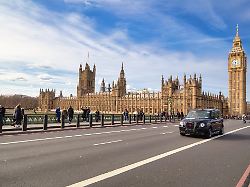Curious Mississippi comparison
London keeps Britain afloat
By Kevin Schulte
09/03/2023, 2:18 p.m
A comparison with Mississippi is not exactly flattering for Great Britain. If the UK were a US state, it would be the second poorest of them all. And even that is no longer certain, writes “The Atlantic” on the “Mississippi question.
“Is Britain really as poor as Mississippi?” This question has the “Financial Times” placed in mid-August. This comparison is exciting because Mississippi is the poorest state in the USA. One in five residents lives below the poverty line, in some counties as much as one in two. And Great Britain? Actually a rich country, but the gap between rich and poor is widening.
A good nine years ago, the British “spectator” made the Mississippi comparison for the first time and calculated that of all 50 US states, only Mississippi is poorer than Great Britain. For this, the newspaper took the gross domestic product per capita and calculated the price differences.
When the Mississippi issue first came up in 2014, it came as a “shock” to the UK, reports “Atlantic”. In Great Britain, the three-million-inhabitant state in the southern United States is a “synonym for backwardness”. The comparison caused outrage among the British, who wanted to denounce the data.
A lot has happened in the past nine years, but little that has been beneficial to the development of the British economy. Investment and export figures have declined as a result of Brexit, and thousands of EU workers are missing.
Still ahead of Mississippi thanks to London?
Without London, the situation would be even worse. The capital of the United Kingdom is the melting pot of the British economy. Subtracting the metropolis, the UK would really fall behind Mississippi in the data. The “Financial Times” has calculated that the British standard of living would drop by a whopping 14 percent if London were excluded from the calculation. This is an unprecedentedly high proportion. For comparison: Munich, Germany’s most productive city, increases the country’s standard of living by only one percent. Silicon Valley accounts for four percent of American productivity.
The negative effects of Brexit are also limited in the financial metropolis. Fears that London would suffer more from the EU exit than other regions of the country proved unfounded. And at least the economy in the capital has already recovered from the Corona slump. The capital region, whose economy has grown since the worst of the corona-related recession in the second quarter of 2020.
So London keeps Great Britain afloat economically – and also above the US state of Mississippi?
The US magazine “The Atlantic” is no longer so sure. The average per capita income in the UK is now even lower than in Mississippi. “Having to admit that the UK is now poorer than the poorest state in the Union could trigger a moment of self-awareness that many Britons seem reluctant to postpone,” reads the analysis.
Great Britain in sleeper mode
The Mississippi-based British author directly challenges the “FT” calculations. He does concede that, taking into account the so-called purchasing power parity, which takes into account the price differences between Great Britain and the US, Mississippi still loses out to the British. However, it makes no sense to compare Magnolia State data with data for the entire United States because “a dollar goes much further here than in New England or on the West Coast”.
In addition, the southern states of the USA have experienced “rapid economic growth” in the past few decades, according to the article. Texas, Georgia, North Carolina, Tennessee, Alabama “thrive”.
Just not Mississippi. But even the poorest American state is now moving in the right direction. Less regulation on the labor market, the almost complete abolition of income tax, more foreign investment.
Great Britain, on the other hand, has “sleepwalked towards regulatory regimentation”. The economy is in trouble. The main reason for the falling economy is neither Brexit nor external circumstances such as the Ukraine war, analyzes “The Atlantic”.
After all, the Mississippi question was raised two years before the historic Brexit vote in the summer of 2016. And the country’s poor performance, productivity and low growth were “obvious long before Brexit”.
“Learned Again” is a podcast for the curious: Why would a ceasefire be just a break for Vladimir Putin? Why does NATO fear the Suwalki Gap? Why does Russia have iPhones again? What small changes in behavior can save 15 percent of energy? Listen in and get a little smarter three times a week.
All episodes can be found in the ntv app, at RTL+, Apple Podcasts and Spotify. “Learned something again” is also included Amazon Music and Google Podcasts available. For all other podcast apps, you can use the RSS feed.
You have a question? Please send us an email to [email protected]
